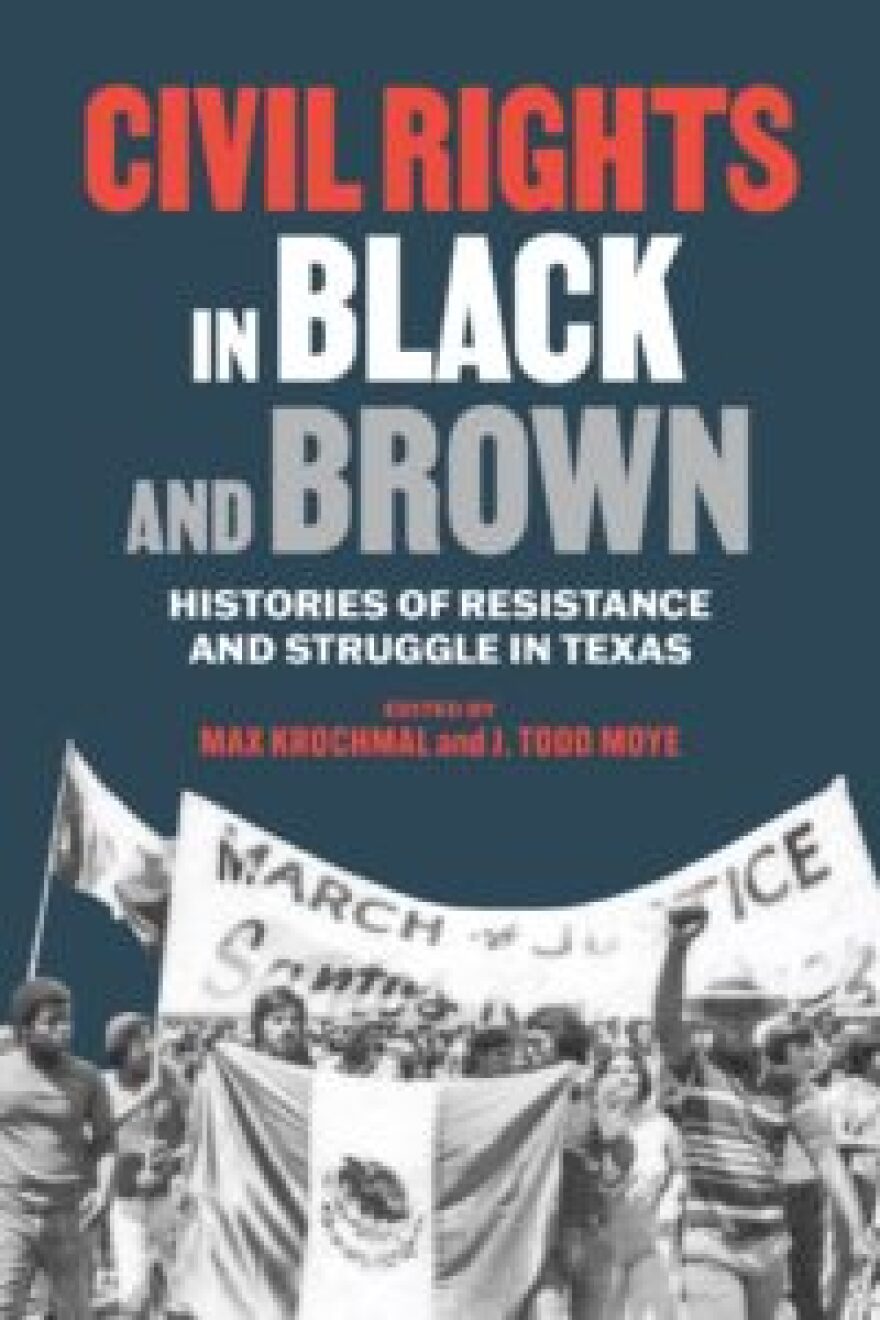A new book examines the organizations and movements in the Black and Latino communities often overlooked by history. "Civil Rights in Black and Brown: Histories of Resistance and Struggle in Texas" is based on an oral history collaboration between Texas universities, and brings together more than 500 voices from the Panhandle to the Piney Woods.
History professors Max Krochmal of Texas Christian University and Todd Moye of the University of North Texas led the project. The pair spoke with Texas Standard. Listen to the interview in the audio player above or read the transcript below
This interview has been edited lightly for clarity.
Texas Standard: How did this oral history project get started, and why did you decide to turn it into a book?
Max Krochmal: When I first arrived at TCU, I looked around and started working with my students to record interviews with activists in the area, and it became apparent that other folks were doing that as well. And so it made sense for us to collaborate with Todd and with a couple of faculty members at University of Texas at Arlington.
The idea was that we needed to help create these sources, that the information was not recorded in the documentary record, that many of these activists were getting up there in age and that if we wanted to be able to tell a true story of the African American and Mexican American liberation struggles in Texas, we needed to go and interview them and get their ideas out of their heads and onto tape and into paper.
And so we threw around the idea of writing a grant so that we could connect these interviews statewide. And on our second try, we got the grant and we were able to hire a whole bunch of graduate students to help us go out and do these interviews all over the state.

Part of the reason this project came about is because of the lack of scholarly research on the civil rights movement in Texas, particularly outside the cities. Can you tell us more about that?
Todd Moye: So many of the newspapers around the state did not cover civil rights protest when it was happening in the 1960s and 1970s, especially, so the documentary record is somewhat lacking. But the knowledge of these struggles exists in communities, and the way to document it is through oral histories. So we really hoped that by creating this big archive that the grant enabled us to create, that we would help start more scholarship on that. And it's been really useful so far for other scholars.
We know of grad students who are using these interviews in their dissertations. We know of journalists who are using it around the state. We know of K-12 teachers who are able to pull in information about local activists for their own teaching. And we, of course, wanted to capitalize on this by having the grad students who had done the interviews around the state and had become experts on these communities to get down on paper what they had learned. And so that was the genesis for the book.
How do you break up these narratives from so many different parts of the state that you feature in the book so that you can tell a cohesive story?
Krochmal: So, as Todd was saying, we kind of charted out the state and we saw there's been some research in the urban areas; we thought there was still more to do. And then mean very little in the rural parts of Deep East Texas, the small towns, there hadn't been as much scholarship on the Valley – the Rio Grande Valley – or El Paso or the Panhandle Plains.
And so we just kind of drew the points on the map. We hired students who hopefully had some connection or expertise in that geographic area, in many cases, and we began workshopping the different chapters together so that they would speak to one another and cover some common themes. And so in the book, we have a section that sort of is more focused on African American history, we have a section that's more focused on Mexican American histories and then a section on metropolitan areas where where they really intersect.
To make this a unified story, you had to talk about the cooperation between activists in the cities and those farther afield. Could you describe what that cooperation looked like?
Krochmal: You know, it varied. We saw examples in which the African American and Chicano movements were really proceeding on parallel or diverging tracks. But particularly in the urban areas, groups came together, and it was often that they identified some common enemies. So even though there they were from separate communities, often, because of segregation, they were cast into different neighborhoods and often different schools, cultures, leaders and so forth. But they sometimes found they had common enemies.
They sometimes found there were issues that intersected or overlapped, for example, struggles against police brutality or struggles to win political self-determination. Those were moments where activists looked around and said, well, you know, looking across the color line would allow them to build power for their communities in new ways. And it wasn't that they had any necessarily underlying similarities, but rather that they were engaged in the very practical work of politics and came to find allies in unlikely places.
Professor Krochmal, did any stories stand out to you in the process of drawing together these accounts?
Krochmal: There are so many wonderful examples. We have a chapter on East Texas that includes stories from Nacogdoches, where there were students at Stephen F. Austin who, were, you know, [they] built a massive protest movement there, a movement that tried to foster inclusion on campus, to win access to jobs in the city, to really finish the process of integrating, and this is into the early '70s.
And it was really remarkable to me because they are describing – Ms. Abdullah, Helena Abdullah is one of the narrators – they're describing huge protest marches and demonstrations that, again, as Todd had said, were never covered in the newspapers, have been blacked out from the newspapers. And so was real startling to find not just individual moments, but mass collective action that had really been erased from the historical record.
What about new stories of movements and people whose stories are just now coming to the surface? Do any stand out to you?
Moye: Max is right; that's like asking two to choose a favorite child. But I'd say one that stands out is the the movement to draw attention to police brutality in the plains. One of our contributors, Joel Zapata, has a great chapter on organizing that happened and Midland and Lubbock, especially, but in Big Spring and other towns around that area in which Mexican Americans organized, again, what in retrospect looked like really big marches involving hundreds and hundreds of people.
It's really a history that had been remembered by the people, remembered by those communities and that history lived on in their memories but it had been forgotten by everyone else. And Max is right: one of the themes that really just jumps out from across the state and all of these interviews and all of these communities and all of these regions is movements against police brutality and police mistreatment of black and brown communities. And it's just impossible to ignore when you see all of this coming together in one place.
If you found the reporting above valuable, please consider making a donation to support it here. Your gift helps pay for everything you find on texasstandard.org and KUT.org. Thanks for donating today.
Copyright 2021 KUT 90.5. To see more, visit KUT 90.5.







